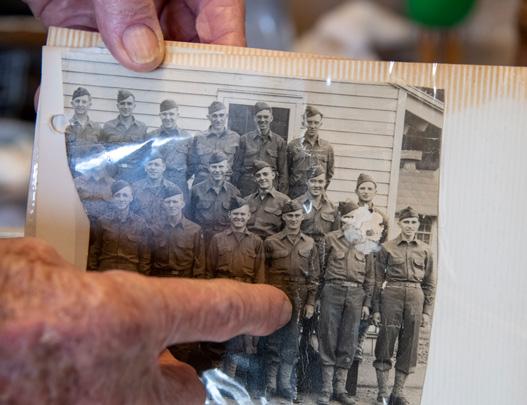
2 minute read
A life of service
Owsley County’s oldest World War II vet takes Honor Flight
Kentucky recognized him for his service with a trip to Washington, D.C. The national organization offers veterans free trips to the nation’s capital to visit memorials and participate in other activities.
While there, Evans and fellow Kentucky WWII veteran, Lewis Fields, laid a wreath at the Tomb of the Unknown Soldier during a formal ceremony. “It was a great honor,” says Mary Best, one of Evans’ three daughters. “Since then, he’s been talking more about his time in the Army. He never did talk about it much.”
War In The Pacific
There’s a reason Evans never talked about his tour of duty, he says. He didn’t participate in battles, and he never got wounded. He figured it was pretty uneventful compared to what others had experienced. In his mind, there simply wasn’t much to say.
Evans was still a teenager when his country called him up. He did what he was told and went where he was sent. To hear him tell it now, that was all there was to it — you did your duty, whether you wanted to or not. But that doesn’t mean he liked it. “It didn’t suit me,” he says with a chuckle.
After boot camp, he traveled with the Army on a supply ship to Guadalcanal, an island in the South Pacific. Eventually, his company anchored off the coast of the Philippines, where Evans spent months at a time without touching dry land. As a clerk in an engineer depot company, he dispensed every kind of hardware to the troops, whether it was a pocket knife or the materials necessary to build a small bridge.
Because his ship carried important supplies, it was protected from the fighting during his years of service. As a result, Evans never saw much conflict, and he rarely even glimpsed the part of the world he was sent to help. He only knows that the people of the Philippines, which had been attacked by the Empire of Japan nine hours after Pearl Harbor, had been fighting for years. By that time, they were tired, poverty-stricken and destitute.
In August 1945, Evans was still serving off the coast of the Philippines when the U.S. effectively ended the War in the Pacific with two atomic bombs. The bombs, which were dropped three days apart on Hiroshima and then Nagasaki, led the Japanese government to officially surrender on Sept. 2. About six months later, Evans got to head back to the hills.

Home Again
Evans jumped straight back into work after returning from the war. In addition to farming tobacco and other crops in his spare time, he worked in a garage and then served 15 years in an oil field in a little community called Fixer in nearby Lee County. “It was a little booming town where they struck oil,” Best says. “I remember him talking about making a path through the snow to get to the oil fields.”

After that, Evans worked for 20 years for the city of Booneville. As superintendent of the water and sewer department, he helped build the infrastructure that brought running water and sewer to parts of the city that had never had it before. He and his wife, Mildred, raised four children, went to church every Sunday, and worked all the other days.


“He’d get up in the morning and feed the animals. Then, he’d go off to his job,” Best says. “There was no time for hobbies because he was always working. He grew tobacco, and he always had pigs and cattle. He built the biggest part of our house, and he very seldom hired anyone to do anything. He just always took care of it himself. He fixed everything.”
As he approaches a century of living, Evans still brings in wood and fetches eggs from his chickens. He’s taken up whittling, although he thinks it’s a poor substitute for daily chores. He also maintains that calmness he’s carried with him throughout his life. There’s a goodness about him, his daughter says, while searching for the best way to describe a person who has spent his life quietly serving others. “He’s a good man and a Godly man,” she says. “You can’t find any better.”







